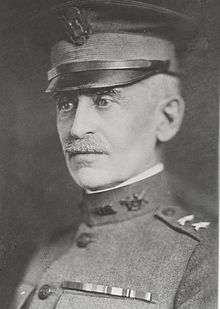Enoch H. Crowder
| Enoch Herbert Crowder | |
|---|---|

Major General Enoch Herbert Crowder
13th Judge Advocate General of the United States Army |
|
| Born |
April 11, 1859 Edinburg, Missouri |
| Died | May 7, 1932 (aged 73) Washington, D.C. |
| Resting Place | Arlington National Cemetery Arlington, Virginia |
| Allegiance |
|
| Service/branch |
|
| Years of service | 1881–1923 |
| Rank |
|
| Commands held | Judge Advocate General |
| Battles/wars |
American Indian Wars Spanish–American War World War I |
| Awards |
|
Major General Enoch Herbert Crowder, USA (April 11, 1859 – May 7, 1932) commonly referred to as General Crowder, was an American Army lawyer who served as the Judge Advocate General of the United States Army from 1911 to 1923. Crowder is most noted for implementing and administering the United States Selective Service Act of 1917, under which thousands of American men were drafted into military service during World War I.
Enoch Crowder was born in Edinburg, Missouri in 1859. After graduating from Grand River College at 16, he taught at local schools until applying to the United States Military Academy on the advice of his mother, Mary Crowder. He entered West Point in 1877, graduating in 1881. Lieutenant Crowder was assigned to the 8th Cavalry, stationed around Brownsville, Texas. During this tour he studied law and in received a license to practice law in Texas in 1884. The same year, Crowder obtained a transfer to the Jefferson Barracks in Missouri.
In 1885, Lieutenant Crowder was assigned Professor of Military Science at the University of Missouri. Here he instructed two companies of cadets and created the first ROTC cadet band in the United States, which later became known as Marching Mizzou. Soon after obtaining a law degree in 1886, Crowder was promoted to First Lieutenant and ordered to rejoin his regiment as a troop commander in the Geronimo campaign. Following the campaign's conclusion in September 1886, he resumed teaching at the University of Missouri until 1889.
...
Wikipedia
